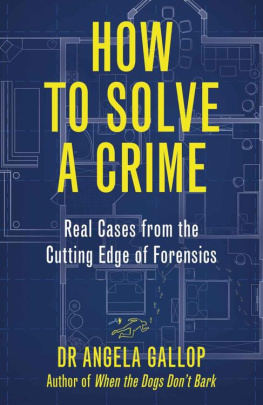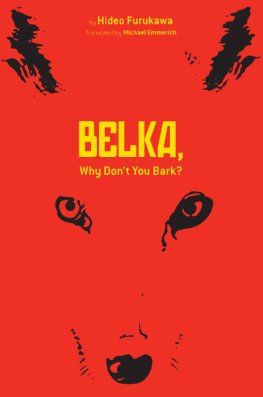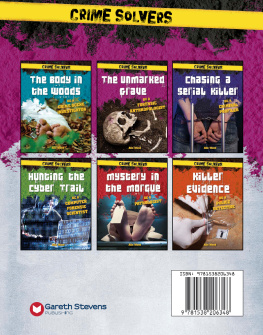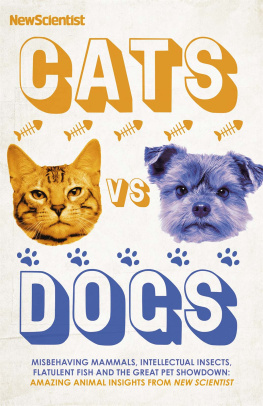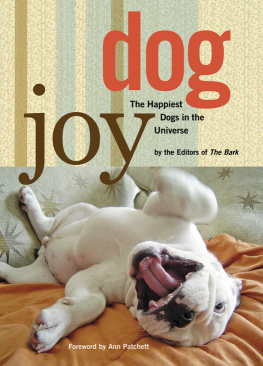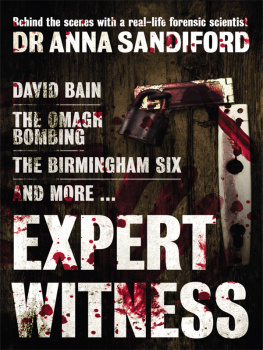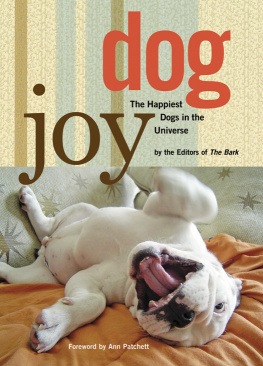Angela Gallop - When the Dogs Don’t Bark: A Forensic Scientist’s Search for the Truth
Here you can read online Angela Gallop - When the Dogs Don’t Bark: A Forensic Scientist’s Search for the Truth full text of the book (entire story) in english for free. Download pdf and epub, get meaning, cover and reviews about this ebook. year: 2019, publisher: Hodder & Stoughton, genre: Non-fiction / History. Description of the work, (preface) as well as reviews are available. Best literature library LitArk.com created for fans of good reading and offers a wide selection of genres:
Romance novel
Science fiction
Adventure
Detective
Science
History
Home and family
Prose
Art
Politics
Computer
Non-fiction
Religion
Business
Children
Humor
Choose a favorite category and find really read worthwhile books. Enjoy immersion in the world of imagination, feel the emotions of the characters or learn something new for yourself, make an fascinating discovery.

- Book:When the Dogs Don’t Bark: A Forensic Scientist’s Search for the Truth
- Author:
- Publisher:Hodder & Stoughton
- Genre:
- Year:2019
- Rating:4 / 5
- Favourites:Add to favourites
- Your mark:
- 80
- 1
- 2
- 3
- 4
- 5
When the Dogs Don’t Bark: A Forensic Scientist’s Search for the Truth: summary, description and annotation
We offer to read an annotation, description, summary or preface (depends on what the author of the book "When the Dogs Don’t Bark: A Forensic Scientist’s Search for the Truth" wrote himself). If you haven't found the necessary information about the book — write in the comments, we will try to find it.
When the Dogs Don’t Bark: A Forensic Scientist’s Search for the Truth — read online for free the complete book (whole text) full work
Below is the text of the book, divided by pages. System saving the place of the last page read, allows you to conveniently read the book "When the Dogs Don’t Bark: A Forensic Scientist’s Search for the Truth" online for free, without having to search again every time where you left off. Put a bookmark, and you can go to the page where you finished reading at any time.
Font size:
Interval:
Bookmark:
Angela Gallop is one of the worlds most eminent forensic scientists. During a career spanning more than 40 years, she has helped to drive change and transformation within the service, both in the UK and abroad. A specialist in cold-case investigations, Angela has led forensic teams to find vital evidence in many of the UKs most challenging cases, including the deaths of Stephen Lawrence, Damilola Taylor, Rachel Nickell Roberto Calvi and many others.
In 2015, Angela was awarded a CBE for her services to forensic science.
When the Dogs Dont Bark
A Forensic Scientists Search for the Truth
Angela Gallop

www.hodder.co.uk
First published in Great Britain in 2019 by Hodder & Stoughton
An Hachette UK company
Copyright Angela Gallop and Jane Smith 2019
The right of Angela Gallop to be identified as the Author of the
Work has been asserted by her in accordance with
the Copyright, Designs and Patents Act 1988.
Some names and identifying details have been changed
to protect the anonymity of the people concerned
All rights reserved. No part of this publication may be reproduced,
stored in a retrieval system, or transmitted, in any form or by any
means without the prior written permission of the publisher, nor be
otherwise circulated in any form of binding or cover other than that
in which it is published and without a similar condition being
imposed on the subsequent purchaser.
A CIP catalogue record for this title is available from the British Library
Hardback ISBN 9781473678835
Trade Paperback ISBN 9781473678842
eBook ISBN 9781473678866
Photograph on page 358 Simon Wilkinson/Shutterstock.com.
All other images Angela Gallop
Hodder & Stoughton Ltd
Carmelite House
50 Victoria Embankment
London EC4Y 0DZ
www.hodder.co.uk
For Jeremy, Simon and Mic for their unfailing optimism and for being constant sources of inspiration. For my brothers, especially Jonathan and David, for their continual encouragement, support and bright ideas. And for David and Gina, who make everything possible.
Contents
Prologue
By the time I arrived at the wood yard in Huddersfield on a bitterly cold night in February 1978, the body of the eighteen-year-old victim had already been taken to the mortuary. I had been working at the Forensic Science Services Harrogate laboratory for just over three years, but this was my first crime scene. And as well as wanting to impress my boss with my knowledge and insights, I was very anxious not to miss anything that might help West Yorkshire Police identify the killer.
Something else that was worrying me as I approached the wood yard was the possibility that I might, quite literally, fall flat on my face. Not having visited a crime scene before, I didnt have any of the scene gear waterproof trousers, anorak and footwear that my more experienced colleagues had accumulated. So I was wearing some clothes my boss just happened to have in the boot of his car. The problem was, Ron Outteridge was a huge man with size eleven feet, and I was struggling to affect an air of competent professionalism while trying to walk in a pair of his wellington boots and control the folds of his massive anorak, which were flapping around my calves.
Nothing can really prepare you for your first crime scene, particularly when it involves a violent death, as is very often the case in my line of work. But there wasnt time for more than a fleeting moment of introspection before I had to focus on trying to work out what might have happened in the icy darkness of the wood yard just a few hours earlier. Then I began the search for any trace evidence that had been left by the killer any fragments of clothing, hairs snagged on jagged bits of wood, or marks left by shoes or car tyres, for example. What added a sense of urgency to the need to find something that could help the police identify whoever had killed Helen Rytka was their suspicion that it might have been the Yorkshire Ripper.
The wrong sort of job for a woman
My brother Jonathan insists that my interest in crime began when I was nine years old and my father often used to buy me, at my request, a copy of the News of the World or Sunday People . Its certainly true that I was fascinated by all the crimes I read about. But the real reason I went with my father to the newsagent every Sunday morning or with Jonathan when I was old enough to cycle there and back with him was more chocolate Flake than newspaper related. And it was actually purely by chance that I became a forensic scientist.
I think I knew from quite a young age that I wanted to do science of some sort. It was a vague ambition that was partly fuelled by the various experiments I used to do with a chemistry set in the cellar of our house in a village just outside Oxford. But it might never have become a reality if I hadnt managed to pass just enough O levels to scrape into the sixth form, which is where my love of botany took root.
Growing up with Jonathan and David, the two of my five brothers who are nearest to me in age, I was accustomed to, and enjoyed, the company of other people. In fact, it was the distractions of the social side of life at school that were largely responsible for my lacklustre academic performance up until the age of sixteen.
My fees at Headington School were paid by a generous great-aunt. But because I had an almost total lack of interest in what I was being taught, I rarely did much homework until I began to study for my A levels. Which is why most of my school reports included some variation of the words if Angela would only try a bit harder. So if my brilliant botany teacher Mrs Thompson hadnt lit something inside me and made me actively want to learn, I might not have done anything much with my life. I certainly wouldnt have become a scientist. As it was, I passed all my A levels in chemistry, zoology and botany (now plant science) and went on to study botany at Sheffield University.
I was offered the chance to stay on at Sheffield and study for a PhD after I graduated. But I was getting married. So I rejected the offer and moved back down south to be with my new husband, Peter Gallop. Then, after working for a while as a lab technician at Oxford University, I converted to a DPhil, with a particular focus on sea slugs.
I became interested in sea slugs for the same reason I was fascinated by plants, which was all to do with the way they work. Its pretty impressive, when you break the processes down, the way plants absorb water and minerals from the soil through their roots, then transport them to their leaves, where they use the green bits (chloroplasts) to convert energy from the sun and carbon dioxide from air to manufacture the food that enables them to flourish and grow. The species of sea slugs I was studying use chloroplasts too, sucking them out of a particular type of seaweed to create a sort of internal sugar factory. And it was on the rather ambitious-sounding basis that they might prove to be the key to solving the food problems of the Third World that I was given a grant for the work I was doing. For the next three years, I spent many happy days scrabbling about on a beach at Bembridge on the Isle of Wight, filling my tiny Fiat 500 car with large containers of seawater and seaweed, and collecting the fascinating little creatures to take back to Oxford to study.
Eventually, however, while I was writing up my thesis, I realised three things: the work I had been doing was unlikely to solve any of the worlds food-shortage problems; I probably wasnt going to find a job with any of the six or seven people in the entire world to whom the work was of any real interest; and I actually wanted to do something more applied that would be of more immediate importance to a larger number of people.
Next pageFont size:
Interval:
Bookmark:
Similar books «When the Dogs Don’t Bark: A Forensic Scientist’s Search for the Truth»
Look at similar books to When the Dogs Don’t Bark: A Forensic Scientist’s Search for the Truth. We have selected literature similar in name and meaning in the hope of providing readers with more options to find new, interesting, not yet read works.
Discussion, reviews of the book When the Dogs Don’t Bark: A Forensic Scientist’s Search for the Truth and just readers' own opinions. Leave your comments, write what you think about the work, its meaning or the main characters. Specify what exactly you liked and what you didn't like, and why you think so.

